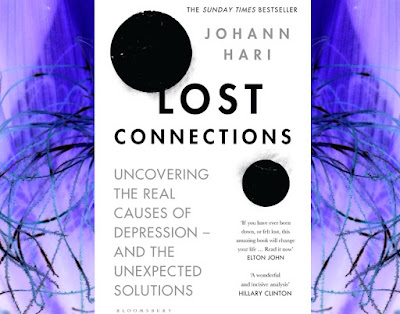Book Review – Lost Connections: Uncovering the Real Causes of Depression – and the Unexpected Solutions
Money muddies many
things. When you have desperate people with health issues, it’s
amazing how many people will crawl out of the woodwork with expensive
“solutions”. The subject of depression is a tough one, and one
that our Big Pharma fuelled society continues to grapple with. Johann
Hari’s Lost Connections: Uncovering the Real Causes of
Depression – and the Unexpected Solutions takes a fascinating
look at why things might be this way, and how we are missing the mark
when it comes to helping people to recover.
Blurb: What really causes depression and anxiety – and how can we really solve them? Award-winning journalist Johann Hari suffered from depression since he was a child and started taking anti-depressants when he was a teenager. He was told that his problems were caused by a chemical imbalance in his brain. As an adult, trained in the social sciences, he began to investigate whether this was true – and he learned that almost everything we have been told about depression and anxiety is wrong.
Early in the book,
Johann hits on something that I came to realise myself during my own
battles with depression. Anti-depressants don’t seem to work if
other factors in your life don’t change. I tried three or four
anti-depressants during college and my early years of chronic
illness, and they all failed to do their job. Johann looks at the
evidence as to the effects of anti-depressants, along with the old
“there’s a chemical imbalance in your brain” spiel, and comes
away feeling wary, having been a “true-believer” before hand. If
nothing else, the way that the big pharmaceutical companies seem to
be allowed to cherry pick which studies they publish is a true
scandal, and something I’ve seen come up in other books and
articles over the years. In many ways, the side-effects are more real
than the benefits, except for a seemingly small number of people.
Johann goes on to look
at the Nine Causes of Depression and Anxiety. These include how a
lack of meaningful work can bring people down, how our disconnection
from the natural world is problematic, and how people lacking a
hopeful or secure future will likely find themselves in the trenches
of depression. The latter part of the book moves on to ways to
reconnect with life, by way of working with other people, finding
meaningful work and values to live by, and generally overcoming an
“addiction to the self” by way of finding sympathetic joy. (If
you have tried loving kindness meditation, you’ll chime with this
last one).
Something that I really
appreciated in Johann’s book is the way that he visited various
people and places to delve more into what was going on. I sometimes
find this kind of thing tedious, but Johann did it in a way that
beautifully illustrated the topic at hand. The one that stands out
the most is his visit to a housing project in Berlin. A disabled
woman posted a note in her window that told the world she was being
evicted due to lack of money to pay the rent, and that she was going to kill herself. She didn’t want
help, only that the reason behind her death be known. She lived in a
fractured neighbourhood, one in which people kept to themselves and
which had a bad reputation. Her window note became the catalyst for
people to begin to talk to each other and ultimately, to challenge
the ridiculous renting rules and regulations, and far more besides.
While little I read
about depression in Lost Connections was totally new to me,
there was plenty of information and background stuff to keep me
hooked. It was a pleasure to read someone presenting their own
struggle with “how to get better” and the various phases they
went through with their relationship to anti-depressants, the
self-doubt and grasping of the story they had been telling themselves
up to that point. If only one message gets out of this book, I hope
it is the one that not only medication should be viewed as an
anti-depressant, and until we view this subject with a broader
vision, we will continue to chase our tails, and continue to
mindlessly fill the coffers of the drug companies.
Book Title: Lost Connections: Uncovering the Real Causes of Depression – and the Unexpected Solutions
Author: Johann
Hari
Publisher:
Bloomsbury
ISBN:
9781408878682

